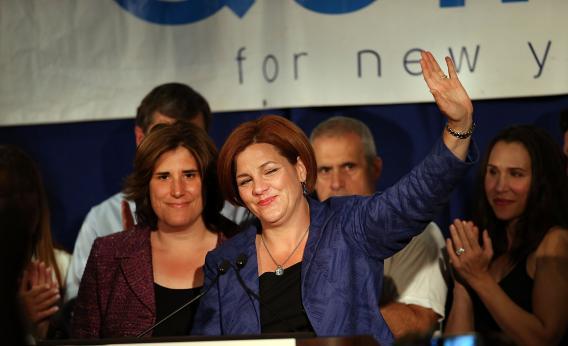As exciting as it would have been to have first female mayor of New York City, female voters at the Democratic primary polls Tuesday decided that making history wasn’t quite a good enough reason to vote for Christine Quinn. (Gay and lesbian voters agreed.) Exit polling shows that 39 percent of women voted for Bill de Blasio, with only a measly 16 percent giving their vote to Quinn. Even Gloria Steinem’s excitable endorsement of Quinn, where she compared Quinn to Bella Abzug and said it would mean so much to young women to “see that it’s possible to have a woman in what is always said to be the most important job in this nation,” did not move the needle in Quinn’s direction.
This isn’t really that big of a surprise. As neat and tidy as it would be to have female voters make their decisions based on gender, women don’t trust that a politician’s gender automatically makes her better on the policy issues that matter. As Sharon Lerner at the American Prospect pointed out, even though Quinn eventually let a bill granting workers guaranteed paid sick days come to a vote, she only did so after delaying it for more than three years. Women are less likely to have a job that guarantees sick days but more likely to need them to do things like care for sick children. So while Quinn is a woman, her stalling tactics on this issue reinforced a sense among many voters that she’s not on the side of women.
Lerner also describes the perception of Quinn as “the establishment candidate,” and for women voting in the Democratic primary, that perception raised concerns that Quinn simply doesn’t care enough about the huge numbers of New Yorkers who aren’t likely to show up in the “wealth porn” pages of the New York Times. Considering that women are more likely to suffer economic insecurity than men, the perception that Quinn was going to be Michael Bloomberg in lady form couldn’t have helped her with female voters.
Female voters are focused on issues of economic security, much more so than men. Pew Research data shows that 64 percent of female voters nationally believe the government should guarantee citizens food and shelter, whereas only 54 percent of men agree. (And while women generally do rate issues like abortion rights as more important to deciding their vote than men do, all of the Democratic candidates in the race are pro-choice, making that a nonissue here.) The lesson of this mayoral race should be clear: To win women’s votes, being female is much less important than caring about economic security and the rights of ordinary working Americans.
Also: Don’t let porn stars show up to taunt you at your election day party.
